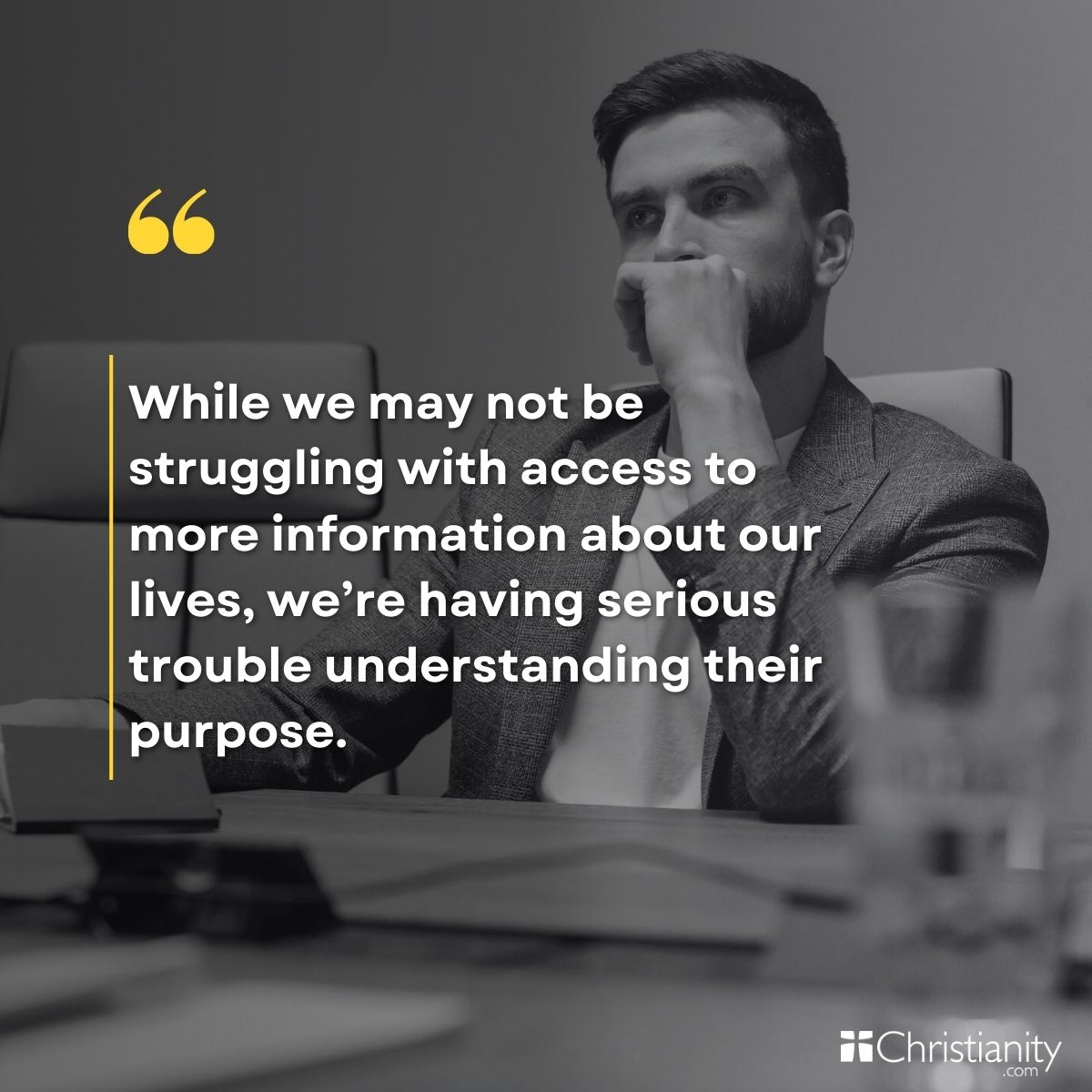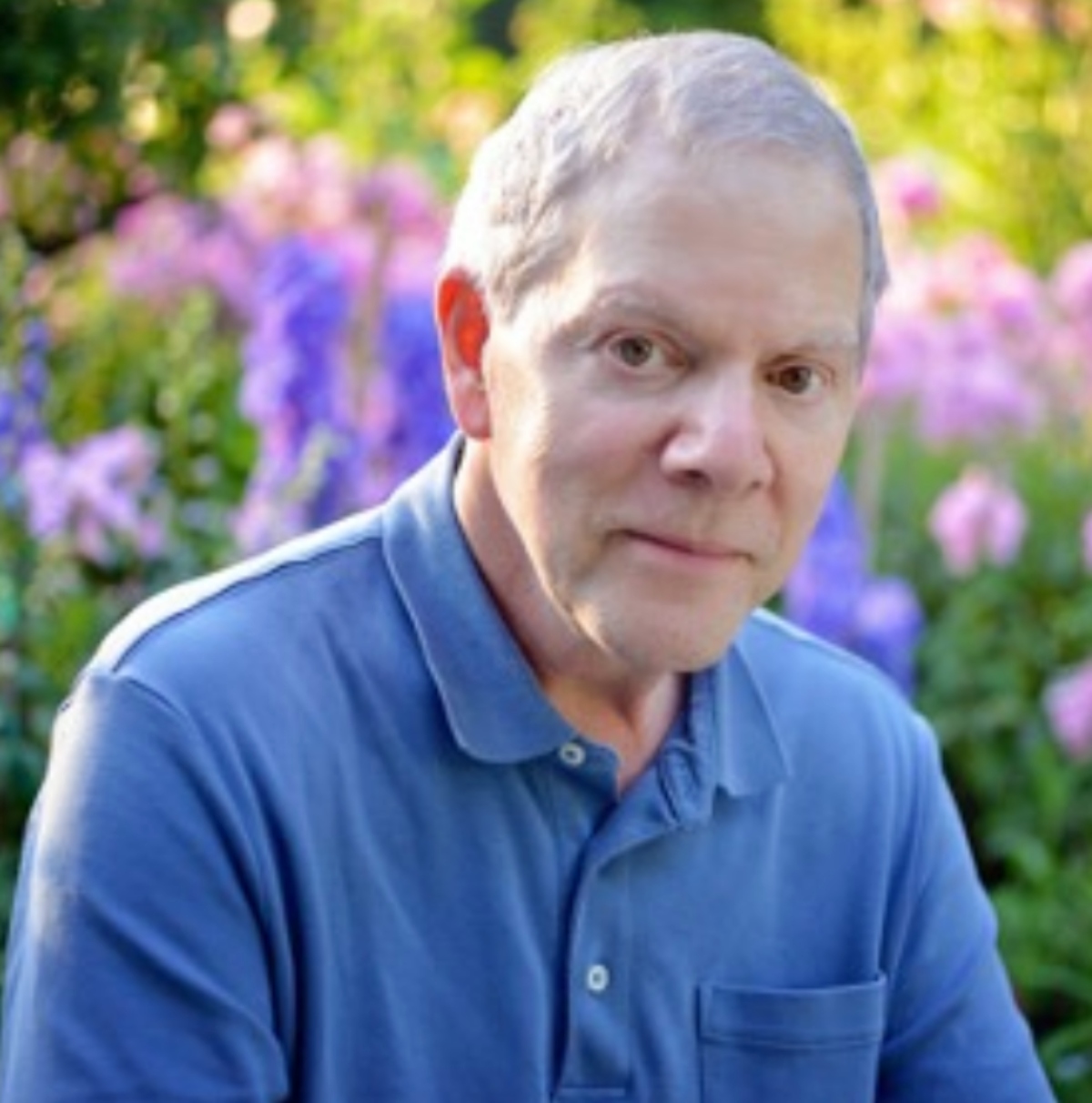Meaninglessness in the Information Age
Our culture is experiencing a “crisis of meaning.” But we first need to be clear on what this does not mean. It does not mean that we’re lacking in information about our lives. Indeed, we obsess over the details of our lives. From apps that measure our steps and sleep patterns to financial software that distills all of our consumer habits into discrete graphs and pie charts, it would be hard to find a culture with more information on the self. In one sense, we know ourselves inside and out better than we ever have. Add to this the myriad technologies that are designed to generate an ambient background that closely matches our interests. The phrase “you might also like,” so prevalent on our devices, is emblematic of this customized environment.
It would also be hard to find a culture in which we knew more about our neighbors. Recall Alfred Hitchcock’s classic Rear Window, in which a paraplegic, Jimmy Stuart, spends a good deal of his time spying on the neighbors in his apartment complex. In effect, Hitchcock transforms all of the building’s windows into individual screens depicting scenes from their tenant’s lives. The advent of social media has performed a similar transformation, making voyeurs of us all. Unlike Stuart’s character, however, we don’t need binoculars and telescopes—all we need is our phones.
Not only do we obsess over the details of our own lives. We stalk others, ransacking their posts and photos for clues of the good life. Many social critics point to the vicious cycle of self-comparison instigated by social media. As we pore over seemingly perfect vacation photos of people with a seemingly perfect sense of adventure and work/life balance, we wonder why our lives feel so barren. What’s the secret? Why can’t we seem to capitalize on the success that seems so natural to others?
Influencers—this generation’s answer to self-help gurus—promise to teach us the secret. If we would only establish a solid morning routine, take regular cold plunges, eat nutrient-dense food, meditate, and hit the gym on a routine basis, we can lay claim to a more fulfilling life.
What’s clear is that any crisis of meaning that we’re experiencing has not come about through a lack of information about ourselves and others. Nor are we lacking in helpful tips, advice, and general “life hacks.” We are awash in information on all these fronts. So, what does it actually mean to say we’re experiencing a crisis of meaning?
A Crisis of Purpose
While we may not be struggling with access to more information about our lives, we’re having serious trouble understanding their purpose. We know all about our heart rates, hormone levels, diet, and finances, but we’re hard-pressed to locate the significance of it all. Many of us receive these details as just another monotonous barrage of information.
In a perceptive essay on the topic of meaning, O. Alan Noble points to the mental seismic shift that’s led us to see the world as little more than a manipulable background to our own interests. Customization is a standard feature of our technology and it’s ushered in many conveniences worth celebrating. However, it’s also brought its share of diminishments. As Noble points out, if we’re not careful, we lose the sense that there’s something bigger than us—something that exceeds our own paltry whims and wishes. This is why a good ice storm that knocks out the power for a while can actually perform a salutary function by reminding us of a powerful world that operates independently of our wills. If our goals extend no further than comfort and convenience, we can expect a life that will feel hollow and bereft of true meaning.

Natural Born Worshippers
So much depends on a sound understanding of human nature. While it may be fashionable to argue that human identity is fluid, if we want to actually make sense of the world and our place in it, we need to wrestle with human nature as it plays out in day-to-day life. When we turn to our basic habits, not only do we quickly conclude that we’re interested in much more than mere survival. We find that we’re natural-born worshippers.
From the religious devotion of an avid Taylor Swift fan (“Swifties") all the way to experiments with tarot cards and psychedelics, our culture is filled with spiritual yearning. But there’s a sad emptiness to many of these quasi-spiritual pursuits. In a word, our era’s trademark devotion to ease and convenience ensures that many people take a consumer approach to spirituality, approaching it like customers in a boutique. The irony here is that our attempts to escape the empty consumerism of our culture by indulging in spiritual practices often end up simply replicating that experience. Just as a goal of nothing more than comfort and convenience leads to a sense of meaninglessness, spiritual exercises that are sold as little more than “religious goods and services”—Eugene Peterson’s phrase—leave us feeling hollow and alone. What we long for is something bigger than ourselves, but most of today’s spiritual practices are thinly veiled invitations to self-deification. Few pursuits are as desolate as self-worship.
Properly Directed Worship
Ecclesiastes 3:11 informs us that God has set eternity in our hearts. If Christianity is true, we were made by God for God, and nothing less than eternity with him will satisfy us. Consequently, if mere comfort and convenience (or mass-marketed spiritual practices) fail to quench this desire, it’s because we were made to live for more than ourselves, and we were made to worship something greater than ourselves. The first step toward a meaningful life is the recognition that we are made to worship something greater than ourselves.
Once we recognize that we were made to worship something greater than ourselves, true worship ought to become our most crucial pursuit. One of the perennial tragedies of human existence involves misdirected worship. When the apostle Paul was waylaid in the city of Athens on his second missionary journey, his heart was troubled because of all the idols that filled this great center of culture. Of particular interest to Paul is an altar with the inscription, “To an Unknown God.” Our modern cities may lack literal altars, but if we read between the lines, we can readily see that our concert venues, sports arenas, movie theaters, and billboards all contain variations of this inscription. The spiritual hunger is there in bold letters. The question remains: What will we worship? The appeal of an unknown God is obvious: Such a vague deity is open-ended, makes no demands of us, and allows us to keep our options open.
Paul points to the altar, making clear that the people of this city are indeed very religious. (Today’s citizens of modern cities might use phrases like “spiritual but not religious.”) But Paul quickly moves beyond the altar: “What you worship in ignorance, this I proclaim to you.” What he proclaims is nothing less than Christ, the resurrected savior of humanity.
We will either be defined by the world or by God’s word. According to God’s word, we are made to worship him forever. The object of our worship has a face and a name. This means the stakes are much higher. We don’t worship some spiritual principle or some murky life force; we worship Jesus Christ, who commands his followers to take up their crosses and follow him. A meaningful life of true worship is available to all. The question is, Will we stop trying to play God?
Photo Credit: ©iStock/Getty Images Plus/primipil

Kenneth Boa equips people to love well (being), learn well (knowing), and live well (doing). He is a writer, teacher, speaker, and mentor and is the President of Reflections Ministries, The Museum of Created Beauty, and Trinity House Publishers.
Publications by Dr. Boa include Conformed to His Image, Handbook to Prayer, Handbook to Leadership, Faith Has Its Reasons, Rewriting Your Broken Story, Life in the Presence of God, Leverage, and Recalibrate Your Life.
Dr. Boa holds a B.S. from Case Institute of Technology, a Th.M. from Dallas Theological Seminary, a Ph.D. from New York University, and a D.Phil. from the University of Oxford in England.





.jpg)